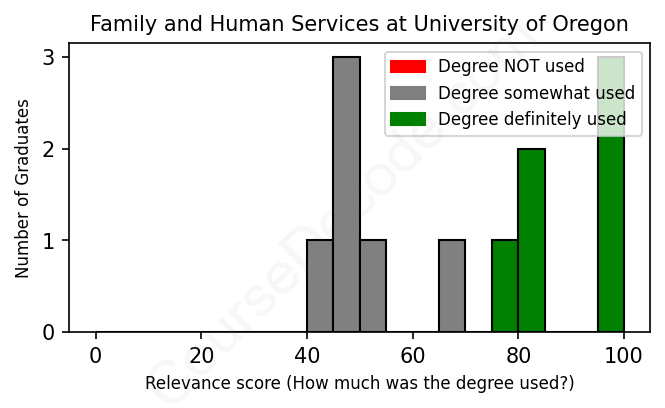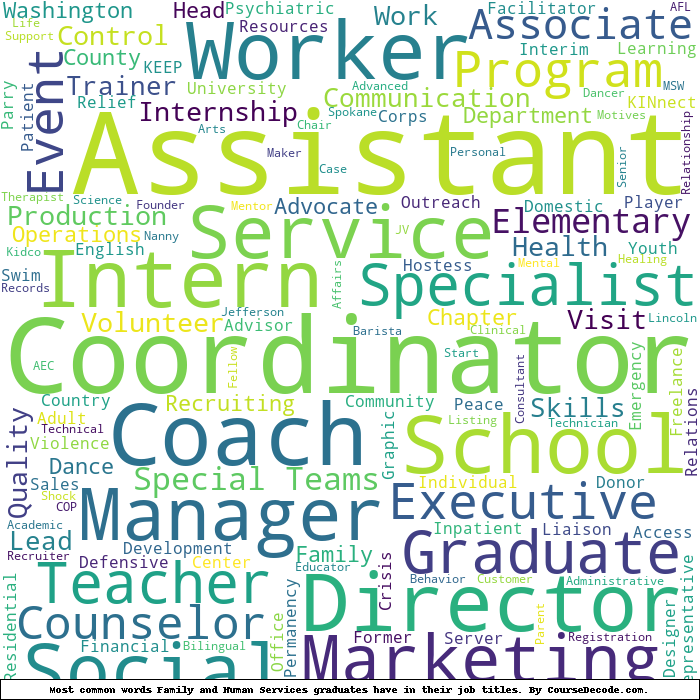
First, some facts. Of the Family and Human Services graduates from University of Oregon we've analyzed , here's how many have used (or NOT used) their degree in their career:

These are estimates based on AI analysis of 12 LinkedIn profiles (see below).
The verdict? Slightly above average. Overall, with an average relevance score of 70%, Family and Human Services graduates from University of Oregon have a slightly higher likelihood (+3%) of finding work in this field compared to the average graduate across all fields:
And for comparison, here's the chart for all profiles we've looked at across all degrees.
Also, after graduating, 41% of these graduates have pursued further education other than another Bachelor's degree (such as a Masters degree or other), compared to the average across all profiles of 35%. This suggests you may need more than just a Bachelors degree to be competitive as a Family and Human Services graduate.
See the details:
|
Relevance score: 76% We think this person has gone into a career highly relevant to their degree. We think this person has gone into a career highly relevant to their degree.
DEGREE INFOGraduated in 2019 from University of Oregon with a Bachelor of Science - BS in Family and Human Services. No other secondary education since. JOB HISTORY SINCE GRADUATIONPersonal Support Worker Allies LLC Jul 2019 - Jun 2020 Healing Arts Program Assistant  The Trauma Healing Project Jul 2019 - Mar 2021 IT Motives Technical Recruiter  IT Motives Nov 2021 - Nov 2022 Washington County Chapter Manager  Unite Oregon Dec 2022 - Mar 2023 Washington County Chapter Director  Unite Oregon Mar 2023 - Jul 2023 ABOUTNo information provided. |
The top 10 most common jobs done by the graduates we've analyzed (ranked most common to least) are:
From the profiles analyzed of individuals who graduated from the Family and Human Services program at the University of Oregon, the most common types of jobs tend to revolve around family advocacy, education, counseling, and community support roles. Many graduates have taken positions like Family Advocate, Mental Health Therapist, School Social Worker, and various teaching roles, where they can directly apply their training in understanding family dynamics and providing essential services. These positions are closely related to their degrees and highlight their commitment to helping families and individuals in their communities.
However, not all jobs listed are highly relevant to Family and Human Services. Some graduates have ventured into roles in sports, marketing, and hospitality, which, while they might leverage some soft skills like teamwork and communication, do not fully utilize the specialized knowledge and skills gained from their education. Jobs like barista, sports coach, or marketing manager tend to stray far from the core focus of human services. Overall, while there's a solid base of job roles that reflect the educational background, there are also notable instances where graduates opted for paths that diverged from the main objectives of the Family and Human Services curriculum.
Here is a visual representation of the most common words in job titles for Family and Human Services graduates (this is across all Family and Human Services graduates we've analyzed, not just those who went to University of Oregon):

Graduates from the Family and Human Services program at the University of Oregon tend to start their careers in roles that align closely with their degree's focus. Right after graduation, many take up positions such as family advocates, social work interns, or teachers in various educational settings. This suggests that their first jobs often revolve around direct support and community service, which is a great way to gain hands-on experience in the field. For instance, individuals have worked as crisis counselors, family services coordinators, or as part of community organizations like the Peace Corps, which highlight a commitment to helping families and individuals in need. Overall, it seems that these early roles are pretty relevant to what they studied, setting the foundation for more advanced positions in social work and educational environments.
As we look further down the line, say about five to ten years after graduation, many of these professionals have climbed the career ladder and taken on more responsibility. We've got people stepping into roles like social service specialists, program managers, and even executive directors at various organizations. This upward trajectory indicates that the experience gained in entry-level positions is being effectively leveraged for more impactful jobs that still connect back to family and human services. However, not every graduate follows this ideal path; some wander into unrelated fields like marketing or even coaching in sports, which can happen if they decide to pivot their careers or explore different interests over time. Nonetheless, a notable portion retains focus on their core mission of serving families and improving community well-being, suggesting a meaningful engagement with their educational background in the long run.
Honestly, a Bachelor’s degree in Family and Human Services can be a bit of a mixed bag when it comes to difficulty. It’s not the easiest degree out there, but it’s also not the most hardcore either. You’ll definitely have to dive into topics like psychology, sociology, and social justice, and some people find those areas totally engaging, while others might struggle a bit. There’s a fair amount of reading, writing, and some hands-on projects or group work involved, which can be challenging if you don’t enjoy that kind of stuff. Overall, I’d say it’s about average in terms of workload; if you’re passionate about helping others and willing to put in the effort, you’ll likely find it rewarding without being overwhelmingly tough!
Most commonly, in the LinkedIn profiles we've looked at, it takes people 4 years to finish a Bachelor degree in Family and Human Services.
Looking at these graduates from the University of Oregon, it seems like they’re mostly in jobs that emphasize helping others, but they're not exactly rolling in the dough. The folks who graduated earlier seem to have carved out some decent careers, especially the ones in sports or education management, which can pay better than social services roles. But for many of them, especially those leaning heavily into social work or counseling, it’s likely they’re earning modest salaries—maybe enough to get by but not enough to stack up like those in corporate gigs or the more competitive athletic roles. So, while some might be doing okay, overall, it looks like financial comfort isn’t the main perk of these paths.
Here is a visual representation of the most common words seen in the "about" section of LinkedIn profiles who have a Bachelor degree in Family and Human Services (this is across all Family and Human Services graduates we've analyzed, not just those who went to University of Oregon). This may or may not be useful:

Here are all colleges offering a Bachelor degree in Family and Human Services (ordered by the average relevance score of their Family and Human Services graduates, best to worst) where we have analyzed at least 10 of their graduates:
| College | Score | Count |
|---|---|---|
 University of Oregon University of Oregon
|
70 | 12 |